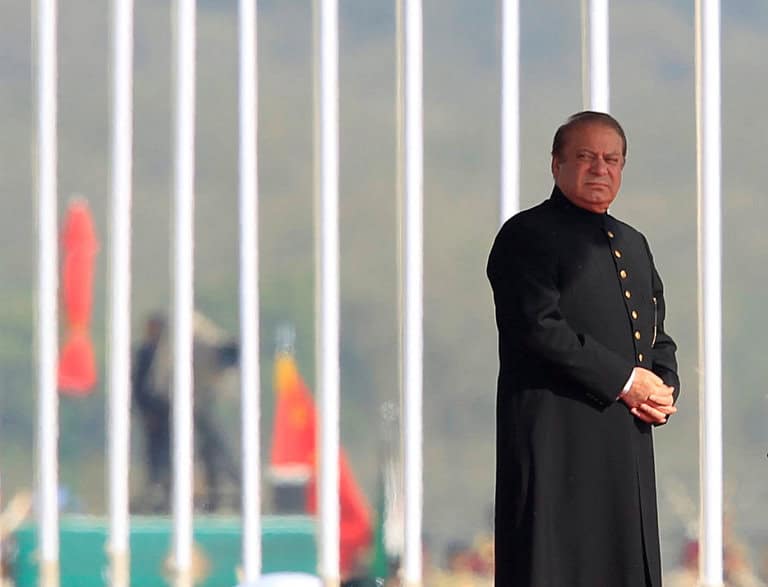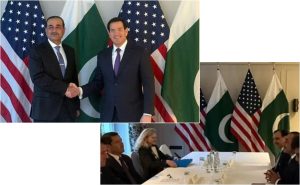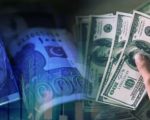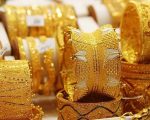Prime Minister Nawaz Sharif appears to be on the last leg of his electoral politics since the hard legal facts ranging from evidence on money laundering to his misconduct are staring at his face in an aggressive manner. A set of foreseeable adverse court rulings on multiple legal grounds against the Prime Minister and his family are almost a foregone legal conclusion.
The grounds for adverse court verdicts are likely to be on the basis of moral turpitude and his alleged behind the scenes role in high-tech white collar crimes to launder money from Pakistan to set up a chained network of offshore companies, steel mills, other businesses and properties in the name of his three children in the Middle East and other overseas destinations.
The only mystery is in what manner and to what extent the Supreme Court would go to hold the Prime Minister and his family accountable on moral turpitude, money laundering and forgery charges.
The severity of legal consequences for Prime Minister and others, however, would revolve around the procedure, legal precedents the Supreme Court would opt for itself to rule on the petitions of the Opposition parties, findings and evidence of Joint Investigation Team (JIT) set up by three judges in April this year.
The Supreme Court is likely to determine the fate of Prime Minister and his family largely on the following three legal formulations:
1- On whether or not to instantly disqualify Prime Minister or refer his case to the Election Commission for adjudication on moral turpitude under article 62 and 63 of the Constitution?
2- In addition to above legal formulation, the apex court would also rule on whether or not to order National Accountability Bureau to hold the trial of Prime Minister and his two sons on money laundering charges?
3- Last but not the least whether or not to order more investigation or directly or indirectly try children of Prime Minister, and others on the charges of forging documents in their failed efforts to prove the money trial to buy their overseas properties?
The Supreme Court’s options on above legal formulations would also determine if Prime Minister is going to be ousted instantly or whether he would gain a little more time to cling on to power.
Here are specific hard legal facts on the basis of which the Supreme Court’s three member bench would hand down their ruling expected in the coming days or weeks:
Likely trial of the Prime Minister, his two sons on money laundering charge
The 20th April 2017 judgments of two minority judges Justice Asif Saeed Khan Khosa and Justice Gulzar Ahmed among a panel of five judges revolved around the web of contradictions the Prime Minister and his family members wove around themselves when they tried to justify the ownership of three luxurious residential properties in London. They ruled that none of the children of the Prime Minister have ever claimed that the businesses set up or the properties acquired in their name had initially been purchased through any personal earning or resources of their own.
They found that the children/wife conceded in their interviews to the media in the past that they were dependent on Nawaz Sharif when the properties were purchased in the early 1990s. Therefore, two judges said that these properties belonged to the Prime Minister. And these were ostensibly disproportionate to the declared and known sources of income of the Prime Minister, hence the National Accountability Bureau was ordered to hold his trial on the charges of corruption and corrupt practices punishable for 14 years imprisonment along with the confiscation of his properties.
However, the other three judges, Justice Ejaz Afzal Khan, Justice Sheikh Azmat Saeed and Justice Ijaz-ul-Ahsan disagreed with their colleagues. They instead ordered more investigation through JIT which has found now far more clear evidence linking the ownership of London flats to Maryam Nawaz, the daughter of the Prime Minister. The JIT contradicted the claim of Hussain Nawaz, Prime Minister’s son that these flats belonged to him. Hussain Nawaz failed to come up with any proof whatsoever to substantiate his claim that these flats belonged to him and were purchased in 2006.
The three member panel of judges may also not ignore how the Prime Minister received between 70 to 80 percent of income back to Pakistan apparently from a factory of his son in Jeddah when the mill was in bad financial health.
This among other evidence is likely to provide sufficient grounds to the three member judges of the Supreme Court to refer Prime Minister and his two children’s case for trial on money-laundering charges like other two judges did on April 20.
Disqualification of the Prime Minister & his son-in-law
Two minority judges in April had cited Prime Minister’s public speeches that he and his family possessed all records pertaining to how they set up factories and purchased flats in London. They concluded in their judgments that Nawaz Sharif in fact lied to the nation by hiding his assets abroad and therefore, they instantly disqualified him on moral turpitude under articles 62 and 63 of the Constitution.
However, other three judges exercised caution in the matter. They had linked their ruling on disqualification with new and more clear evidence which the JIT now seems to have got hold of. That is the verified copy of correspondence between Mossack Fonseca, the money laundering company for Sharif family, and Financial Investigation Agency of British Virgin Islands which officially confirmed that Maryam Nawaz is the legal owner of London-based expensive properties purchased by Prime Minister Nawaz Sharif in her name through two Panama-based off-shore companies Nielsen and Nescoll from 1993 to 1995.
Now the three judges have to determine on whether or not she was dependent on Nawaz Sharif in early 1990s. In view of emergence of more evidence, the justices may not ignore now that Nawaz Sharif had also shown her as dependent on him in 2011’s tax returns.
The evidence about the ownership of flats in London in the name of Maryam Nawaz, is also likely to come down hard on Prime Minister’s son-in-law Captain retired Safdar. He may be disqualified since he concealed the ownership of his wife’s flat in the declaration of his annual statements of assets and liabilities with the Election Commission.
Solid Evidence
The JIT has found that the Prime Minister Nawaz Sharif was the Chairman of Capital FZE – a UAE based offshore company and was drawing his salary from the company. Under the law of the land, Sharif was bound to show his assets in his tax returns and declare them in his annual statement of assets and liabilities with the Election Commission. However, he did not do so. The company was operative till 2014. This is the most direct evidence to disqualify him.
PM’s Gamble to mislead SC to refer disqualification case to EC
The efforts of the Prime Minister’s legal team has been to avert the instant disqualification no matter at what cost. Never during the course of arguments in the Supreme Court did the Prime Minister’s counsel confirm that he showed the ownership of UAE based company in his nomination papers for 2013’s general elections. Because that was not the case. However, after the proceedings of the entire case concluded, Prime Minister in written arguments submitted with the apex court, also added of what appears to be “ newly manufactured legal facts” something similar to what his children extensively did in their failed efforts to produce evidence to prove the sources of income with which they purchased properties abroad.
Now the Prime Minister has claimed that the copy of his passport detailing the work permit was annexed with his 2013’s nomination papers together with a document of his employment at Dubai based company, something many suspect may be yet another incident of forgery to avert direct disqualification when the Supreme Court announces its judgement in the coming days. This can not happen without tampering with the official record in the archives of the Election Commission. It seems to be yet another attempt on the part of the Prime Minster to create doubts in the minds of judges so that they refer his case for disqualification to the Election Commission so that the government may prolong the proceedings through delaying tactics. This risky business of alleged forgery however, may land the Prime Minister in serious trouble sooner or later.
What if there is split judgement?
Three judges may split in their verdicts on the question of ruling themselves or referring the case to the Election Commission for disqualification of Prime Minister and his son-in-law. If this happens, there would be a heated legal controversy on whether or not to count the judgments of other two judges who had already disqualified Prime Minister in April this year. But surely it would be extremely difficult for Prime Minister to survive politically. However, the Supreme Court’s three judges are likely to have consensus on other aspects of verdicts including the one on referring case of Prime Minister and his two children on money laundering and forgery charges.
The fate of Shehbaz Sharif & Ishaq Dar
Ishaq Dar, Finance Minister in a confessional affidavit in 2000 before a magistrate provided specific details on how money was channeled illegally from Pakistan to abroad on behalf of Prime Minister Nawaz Sharif and his brother Shehbaz Sharif, Chief Minister Punjab. Later Dar retracted his statement and argued that he did so under duress from the then military regime. Subsequently, Lahore High Court dismissed his confessional affidavit. The NAB under the influence of Sharif family played a real legal trick by not filing an appeal with the Supreme Court against the unusual High Court verdict. Two Supreme Court judges in their dissenting note on April 20 had ordered the NAB to file an appeal with the top court requesting to waive-off time-bar condition to hear an appeal against High Court ruling. Three other judges had withheld their verdict pending further investigation. Now the JIT has found more collaborating and incriminating evidence to substantiate Dar’s confessions. The judgement of the Supreme Court on whether or not order to reopen this case would determine the political fate of both leaders.
Adverse verdict likely on perjury charges against the ruling family
The Supreme Court may order the Federal Investigating Agency to carry out more investigation against members of Sharif family or hold their trial on its own or through a subordinate trial court on the charges of forging documents. Maryam Nawaz, her husband Captain retired Safdar, Prime Minister’s son Hussain Nawaz and premier’s cousin Tariq Shafi, are likely to be among the accused.
Under the law, Sharif family was bound to come up with documentary evidence to prove that they purchased properties in London through legitimate sources of income. Failure to do so, the JIT said, misled Sharif family to forge documents one after the other and hence were responsible for perjury which is a criminal offense punishable by seven years in imprisonment.
As per JIT findings, Maryam Nawaz and Hussain Nawaz forged the documents to show that she was a trustee of the properties in London in 2006 and not the real owner of flats which her brother wrongly claimed belongs to him. The forgery was designed to avert legal implications against Prime Minister that she was dependent on her father when he secretly purchased properties in London in early 1990s.














